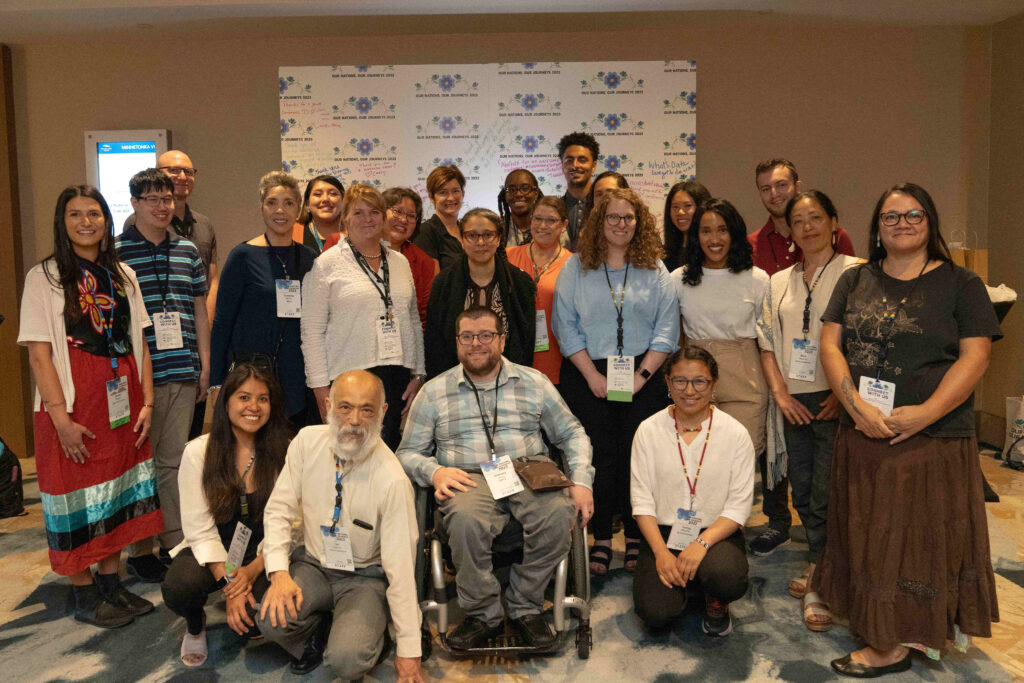This past week, I was proud to be part of the Seven Directions Indigenous Public Health Institute’s first-ever Indigenous Public Health Awards ceremony during our three-day conference at the Mystic Lake Conference Center in Prior Lake, Minn. The awards were presented to eight outstanding individuals and teams who embody service to and with their communities and value-based work in the Indigenous public health field. This year’s “Our Nations, Our Journeys” forum theme was “Healing from the Opioid Epidemic through Strengths-based Approaches and Data Sovereignty.”
As the Director of Seven Directions, housed in the Center for the Study of Health and Risk Behaviors within the Department of Psychiatry and Behavioral Sciences at the University of Washington, and as an enrolled member of the Mandan and Hidatsa tribes, I am aware of the historical misconduct perpetuated on tribes in the United States by public and clinical health institutions. It is essential for public health professionals and organizations working with tribal communities today to work from a place of value-based cultural humility and respect.

NNPHI and Seven Directions colleagues at the ONOJ 2023 Conference. Photo Credits: Craig Dee (Instagram: @craigdee_)
Seven Directions is an organization that strives to support tribal communities through our seven core values (or, directions) that guide us as an organization. The awards presented at our biennial conference originate from these same seven values, which align with the value systems of many Indigenous communities. These values represent the areas for growth and the relationships needed to move towards a more integrated public health system grounded in Native cultures and centered on family and community.
In presenting these awards, we honor those who demonstrate what value-based Indigenous public health work looks like. The Seven Direction’s Values and Award recipients include:
Award 1- Integration and Holistic Wellness
Jacquelynn Engebretson, on behalf of the Alaska Native Blanket Exercise Team at the Alaska Native Tribal Health Consortium in Anchorage, Alaska
This award honors the idea that an integrated, holistic wellness model leads to better health outcomes.
Award 2- Culture & Identity
Lauren Stevens, Director of Culture, Connection, and Support – on behalf of her team at Wabanaki Public Health and Wellness
This award honors public health work that reclaims, revitalizes, or reaffirms Indigenous knowledge, culture, or ceremony as sources for healing, wellness, and health.
Award 3- Families & Communities
Tiffany Web, on behalf of the Bristol Bay Area Health Corporation Overdose Prevention Team, Alaska
This award honors significant efforts to support Native families in their foundational role in promoting Indigenous wellness and community wellbeing.
Award 4- Respect for Sovereignty
Chairman Nickolaus D. Lewis, Lummi Nation, Washington State
The award for Respect for Sovereignty goes to someone who has expanded advocacy and state and federal policies to protect and advance Native sovereignty and health.
Award 5- Service
Dr. Antony Stately, Executive Director, Native American Community Clinic, Minneapolis, MN.
The Service award goes to someone who demonstrates a tireless commitment to building Indigenous public health workforce capacity.
Award 6- Indigenous Knowledge
Dr. David Begay, Navajo Elder, traditional healer, Adjunct Professor, Northern Arizona University Physics and Astronomy Department, and Research Associate Professor, University of New Mexico, College of Pharmacy.
The award for Indigenous Knowledge honors an individual who knows that data is power: What we collect, how we collect, and how we use data in a healthcare context affects the quality of care in tribal communities and families.
Award 7- Tribal Governance
Chairman Leonard Forsman, Suquamish Tribe, Washington State
The award for Tribal Governance recognizes someone whose work has bolstered the capacity of Tribal public health systems and made significant efforts to strengthen Indigenous public health authority.
Award 8- Seven Directions’ Opioid Technical Advisory Group Lifetime Contribution to Indigenous Public Health Award
Bonnie Duran, DrPH, Professor, University of Washington School of Social Work
We also presented a special 8th award, The Opioid Technical Advisory Group Lifetime Contribution Award, to honor someone who has significantly contributed to the Indigenous public health field over the course of her career. Dr. Duran has dedicated her career to advancing Indigenous social determinants of health scholarship and practice, implementing Community-Based Participatory Research (CBPR) partnerships with communities to eliminate health inequities; and fostering quality mentoring relationships with hundreds of Indigenous public health students, scholars, and practitioners to promote professional development and career advancement.
Each awardee was honored with two gifts: a glass award with their name and award title and a blanket embroidered with their name and recognition. The blankets were provided by Eighth Generation, an Indigenous artist collective based out of Seattle and owned by the Snoqualmie tribe.
During our inaugural awards selection process, we worked with community partners and advisors to select a broad, multi-talented group of awardees whose exemplary leadership in the Indigenous public health field has stood out over the past several years. We recognize that many organizations, teams, and individuals embody these values as well and look forward to honoring and uplifting future tribal public health leaders at future Our Nations, Our Journeys conferences to come.
About Our Guest Author
Myra Parker, JD, MPH, Ph.D., is an enrolled member of the Mandan and Hidatsa tribes and serves as an Associate Professor in the Department of Psychiatry and Behavioral Sciences at the University of Washington School of Medicine. She is currently the Director of Seven Directions, housed in the Center for the Study of Health and Risk Behaviors within the Department of Psychiatry and Behavioral Sciences.
